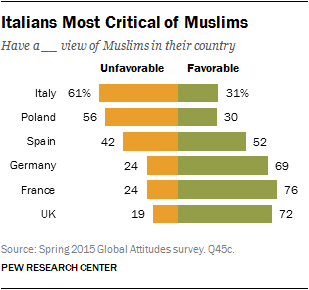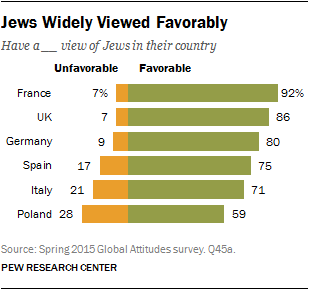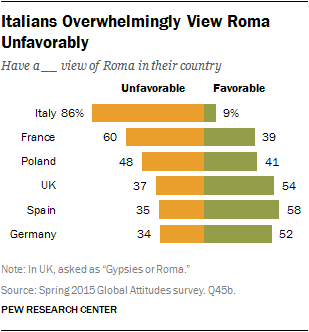The economic downturn in Europe that followed the euro crisis raised concerns that economic stress would turn Europeans against each other, as many severe economic downturns have done throughout history, sparking xenophobia and anti-Semitism. And Europe has seen a number of hostile actions against Muslims, Jews, Roma and other minorities in recent years. But the activities of a few are not necessarily reflected in the views of the general public.
The 2015 Pew Research Center survey was conducted after the Charlie Hebdo massacre and the simultaneous attack on a Jewish grocery store, perpetrated by radical Islamists in Paris. But, in the wake of these events, there is no evidence that the atrocity sparked new public antipathy toward Muslims in any of the six European Union nations surveyed. In fact, favorability of Muslims actually improved in some nations. At the same time, French sympathy for Jews increased.
Europeans Mostly Positive on Muslims

Only in Italy and Poland do negative opinions about Muslims outweigh affirmative views, by almost two-to-one: 61% to 31% in Italy and 56% to 30% in Poland.
Anti-Muslim sentiment is disproportionately a right-wing phenomenon in Europe. French who place themselves on the right (37%) of the political spectrum are more likely than people on the left (15%) to bear unfavorable views of Muslims, by 22 percentage points. There is a similar 21-point differential between the attitudes of Germans on the right (36%) and Germans on the left (15%). Seven-in-ten Italians who consider themselves on the right have unfavorable views of Muslims, as do nearly half (49%) of self-avowed Italians on the left. Notably, more than six-in-ten Poles on the left (63%) see Muslims in an unfavorable light, similar to the 59% on the right.
Jews Seen Favorably

More than eight-in-ten British (86%) also voice a positive attitude toward Jews, largely unchanged in recent years. Fully 80% of Germans hold a favorable opinion of Jews, little different from views in 2014, but a marked increase from 53% who saw Jews in a positive light in 1991. Three-quarters of people in Spain see Jews favorably, as do about seven-in-ten Italians (71%) and six-in-ten Poles (59%). The Polish and Spanish points of view have not changed much in the last year.
The strongest anti-Semitic sentiment is in Poland, where 28% say they have an unfavorable opinion of Jews.
Roma Generate Greatest Anti-Minority Sentiment

The most widespread anti-minority sentiment found in the survey was expressed against the Roma, also sometimes called Gypsies. Anti-Roma views are particularly prevalent among Italians (86% unfavorable) and the French (60%). Meanwhile, more than half in Spain (58%), the UK (54%) and Germany (52%) voice a favorable opinion of Roma. The lowest favorable ratings were in Italy (9%), France (39%) and Poland (41%).
Women have a more positive view of Roma than men do in both the UK (58% among women vs. 49% among men) and Spain (64% vs. 54%, respectively). A majority of people on the left in France (56%) are favorably disposed toward Roma, while three-quarters of French on the right hold an unfavorable opinion. Similarly, while 65% of those on the left in Britain have a positive view, nearly half (49%) on the right make a negative assessment.




